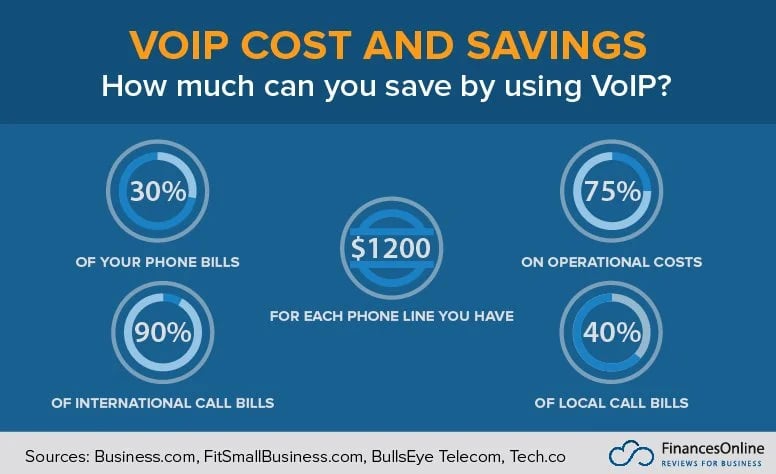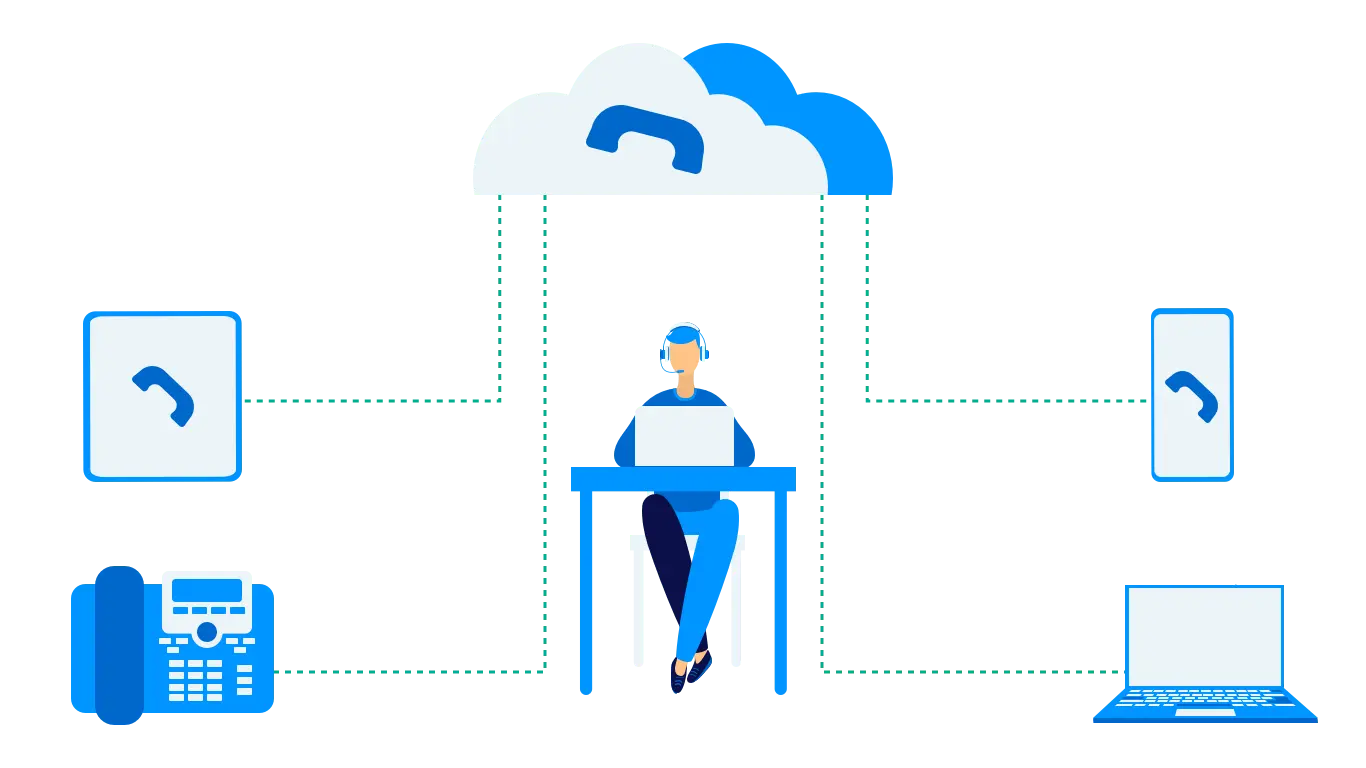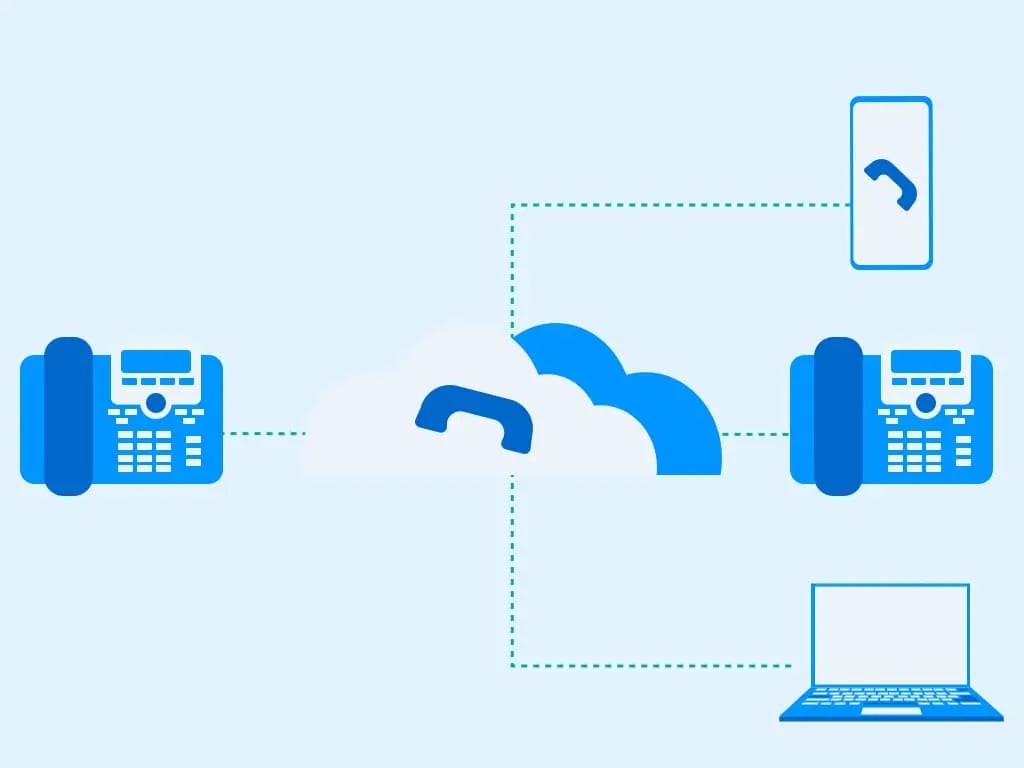How Much Does VoIP Cost?
Price levels for internet calling vary widely from one VoIP provider to another. VoIP calls may be free or they may come with a charge. In the VoIP industry, the standard practice is to pay a monthly or annual fee for all of your lines.
To give you an idea about VoIP and traditional phone system costs we compared their initial and monthly costs, device costs, and international calling costs.
VoIP
|
Traditional Phone System
|
|
Initial costs: $0-$19.99 per line
|
Installation fee: $50-$99.99
|
|
Monthly costs: $17-$29 per line
|
Deposit: $50-$400 per line
|
|
Device costs: Free (for some plans)
|
Maintenance monthly fee: 80+
|
|
International calls: Free to 40+ countries. $0.01+ per minute to other
|
International calls: $1.00+ per minute
|
How Much You Can Save Using VoIP?
Businesses report huge cost savings when switching to cloud PBX – 90% saved on international call bills, 40% on local phone bills, and 75% on operational costs, equating to $1,200 of savings for each phone line they have.

VoIP Equipment and Hardware
One of the main advantages of employing a VoIP unified communications solutions is there’s not a lot of equipment required to facilitate it. There are however one or two pieces of hardware which are essential/nice to have.
Essential Equipment and Hardware
A device from which to run the VoIP platform and initiate calls is essential to a functioning VoIP system. With many communications providers this can be a computer, laptop, smartphone, or tablet.
Any connected device which is compatible with your service provider can be used to make calls.
If you are calling from a busy office or contact center, you will need either a headset or a handset to make calls.
Customer privacy is important, so this will be essential for making customer-facing calls.
You will also need an internet connection. If using a mobile device, this can either be a mobile internet protocol such as 5G or any WiFi you might have access to. In an office setting, you will require a commercial internet package and ample ethernet ports for the device you have installed.
Optional Equipment
You may decide you prefer a physical device from which to make calls, in which case you will need a VoIP hard phone. This type of device looks very much like a traditional landline telephone but will often carry VoIP specific features such as call transfer, multiparty calling, and support for multiple VoIP accounts.
How to Choose the Best VoIP Provider in 2022?
Which is the best VoIP provider? The answer will depend on your needs, budget, and circumstances.
Here are some general tips for selecting the best business voice over IP providers:
- Identify the communications features that you need most.
- Take future expansion or business growth into account.
- Establish the size of your budget.
- Make a comparative assessment of voice over internet providers, and what they have to offer.
- Look for testimonials, reviews, and customer referrals for the providers on your shortlist.
- Don’t forget to factor in what kind of technical support they have available.
For Sole Proprietors And Micro-scale Enterprises
At the single owner or micro start-up stage, incoming calls are vital – so a customizable Auto-Attendant is a must. Call routing to your designated best numbers, or to your best qualified employees are the key features to look for. Custom messages for promotion and Music On Hold can help boost your image.
For Small Offices
For diverse small and medium-sized enterprises (SMEs) VoIP providers should offer small business phone system solutions with a variety of VoIP options together with calling features and levels of integration with web and mobile applications or office software.
For Large-scale Enterprises
Companies with large workforces and numerous phone lines should expect to see dramatic savings from VoIP – from 30 to as much as 90%. Shop around for a balance offering the best feature set and the highest savings.
For Dedicated Call Centers
If you operate a call center, many business VoIP providers offer dedicated packages to address your need for huge numbers of incoming and outgoing calls, reduced waiting times, comprehensive feature sets, and quality assurance.
Look for call recording facilities with analytics and reporting tools, to enhance your call monitoring and customer experience refinements. Manage customer calls and interactions directly with an intellegent cloud contact center.
For All Users…
The ideal VoIP solution should be fully capable of meeting all the operational and business needs you specify, with options to reconfigure or customize your subscriptions in response to changing conditions.
FAQs
Do I Need a Voice-over IP Phone System?
Look at your existing phone system and ask these key questions:
- Will I need to keep all of my existing system and just use adapters or converters to get voice over IP capability?
- Can I replace some of the components?
- Do I have to replace the entire set-up?
If you run a small to medium-sized business in 2022, VoIP is something that you will need to elevate your communications capabilities to compete with same-size enterprises and also ones larger than your own.
net2phone’s small business phone system is designed to fuel growth with every conversation.
As Jonah Fink, President of leading VoIP provider net2phone observes: “Law firms, real estate offices, medical practices, really any type of professional service or retail business, all share the common goal of needing more features and functionality to improve their business’s communication and add savings to their bottom line. net2phone understands that voice is the lifeline of business communications today and we’re excelling at providing excellent service every step of the way.”
Whether you’re working from home or the office, voice over IP provides a cost-effective and scalable business communications solution with multiple features -- and one that’s available anywhere with access to the internet.
With PSTN (Public Switched Telephone Network) phone systems being phased out in many regions, you’ll also need VoIP phone systems to stay in line with current prevailing technology and new business norms.
Can VoIP receive text messages?
Yes, VoIP can receive texts sent from mobile devices or other VoIP networks.
Is VoIP Reliable?
Absolutely. VoIP uses a combination of advanced internet protocols to ensure calls remain clear and stable.





